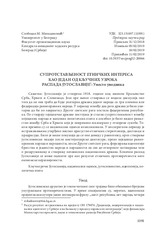Please use this identifier to cite or link to this item:
https://rfos.fon.bg.ac.rs/handle/123456789/1769| Title: | Suprotstavljenost etničkih interesa kao jedan od ključnih uzroka raspada Jugoslavije - umesto uvodnika The opposition of ethnic interests as one of the key causes of Yugoslav state disintegration: Instead of the editorial |
Authors: | Miladinović, Slobodan | Keywords: | politička elita;nacionalni odnosi;jugoslovenstvo;Jugoslavija;ideologija;Yugoslavism;Yugoslavia;political elite;national relations;ideology | Issue Date: | 2018 | Publisher: | Sociološko društvo Srbije, Beograd | Abstract: | Jugoslavija je stvorena 1918. godine pod imenom Kraljevstvo Srba, Hrvata i Slovenaca. Još pre njenog stvaranja se vodila diskusija oko toga da li ona treba da bude unitarna država jednog naroda sa tri plemena ili federacija ravnopravnih naroda. U periodu između dva rata država je bila unitarna da bi po završetku Drugog svetskog rata postala federativna republika. Po stvaraju zajedničke države postojala je stalna suprotstavljenost između pojedinih naroda i njihovih političkih elita a posebno je bilo vidno rivalstvo između Srba i Hrvata koje je povremeno eskaliralo u otvorene sukobe. Tokom vremena su se nacionalni odnosi komplikovali. U posleratnom periodu je istraživanjima utvrđeno visoko prisustvo etničkih stereotipija, distanci i predrasuda. Bilo je više pokušaja da se one dovedu u ravnotežu, kroz stvaranje jugoslovenske nacije posle šestojanuarske diktature, preko zajednice ravnopravnih naroda i narodnosti, posle Drugog svetskog rata, forsiranja ideologije bratstva i jedinstva naroda i narodnosti pa sve do otvorenog zagovaranja teze o razdruživanju i stvaranju nezavisnih nacionalnih država. Konačni raspad Jugoslavije se može oceniti pre kao rezultat etničkih protivrečnosti nego ekonomske nerazvijenosti. Yugoslavia was created in 1918 under the name of the Kingdom of Serbs, Croats and Slovenes. Prior to its creation, there were discussions on whether it should be a unitary state of one nation with three tribes or a federation of equal peoples. In the period between the two wars, the state was unitary, becoming a federal republic after the end of the Second World War. After the creation of the common state, there was a continuing conflict between individual peoples and their political elites, and there was visible rivalry between Serbs and Croats, in particular, that occasionally escalated into open conflicts. Over time, national relations grew increasingly complicated. In the post-war period, research found a high presence of ethnic stereotypes, distances and prejudices. There were multiple attempts to bring them into balance, by means of establishing the Yugoslav nation after the 6 January Dictatorship, then the community of equal peoples and nationalities, after the Second World War, forcing the ideology of fraternity and the unity of nations and nationalities, and finally openly advocating the thesis on the disintegration and the creation of independent national states. The final disintegration of Yugoslavia can be assessed as a result of ethnic conflicts rather than of economic underdevelopment. |
URI: | https://rfos.fon.bg.ac.rs/handle/123456789/1769 | ISSN: | 0085-6320 |
| Appears in Collections: | Radovi istraživača / Researchers’ publications |
Show full item record
Page view(s)
6
checked on Dec 28, 2025
Download(s)
6
checked on Dec 28, 2025
Google ScholarTM
Check
Altmetric
This item is licensed under a Creative Commons License


